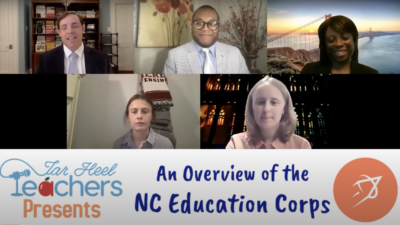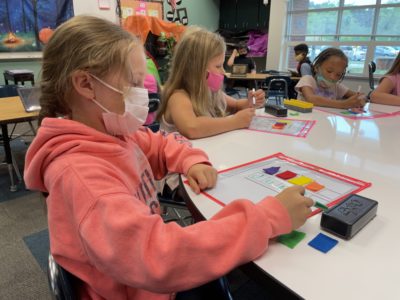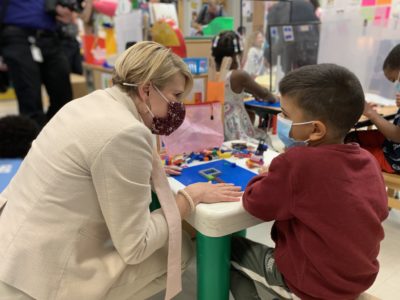

The classroom teacher remains the pivotal school-based influence on the academic achievement of students. As educators ponder how to rebound from the disruption wrought by COVID-19, the pandemic has ignited initiatives and discussions around augmenting the central role of the teacher.
“Anything to extend the impact of the teacher, we ought to invest in,” says Mike Ward, a former superintendent of public instruction who is a lead organizer of the North Carolina Education Corps. Ward spoke in an interview as the education corps this week dispatched 144 literacy tutors to 22 public school districts, as well as a charter school.
Meanwhile, the General Assembly’s budget negotiators have under consideration an appropriation of federal pandemic-response funding for tutoring. The Senate budget provides $10 million without naming a recipient. The House version calls for $13.2 million specifically to the education corps.
The backdrop to these developments comes in the evidence of “learning loss” or “unfinished learning” in the shift from in-class to online instruction to contain contagion. The State Board of Education received a report last week on widespread lower scores on year-end tests.
“It’s been a really hard year on little folks,” says Ward. “We have a lot of vulnerable kids in the early grades.”
In a recent article on “tutoring as a tried-and-true method,” the national Hechinger Report spotlighted an initiative in Guilford County Schools, which deployed 15 graduate students and 35 undergraduates — engineering, math, and education majors — from nearby universities as math tutors. The system also had 140 high-achieving high school students as tutors in middle schools.
“A 2020 review of nearly 100 tutoring programs found that intensive tutoring was particularly helpful in reading during the early elementary years, and most effective in math for slightly older children,” the Hechinger Report article reads. “And another study found that intensive tutoring had major positive impacts on math gains among high school students.”
The North Carolina Education Corps began as a joint project of the State Board of Education and Gov. Roy Cooper. It is organized as an independent nonprofit entity, with some early funding from philanthropies.
When the education corps launched in September 2020, it set out recruiting university and community college students. The early participants engaged in a variety of supporting roles, including contact tracing.
For the 2021-22 school year, the corps has tightened its focus to what Ward calls “high-dose” literacy tutoring in kindergarten through third grade. That focus aligns with priorities of the Department of Public Instruction and, significantly, with the recently upgraded and enacted third-grade reading measure championed by Republican Senate leader Phil Berger.
While still recruiting college students, the corps has recently attracted retired educators. All participating tutors receive training in the science of reading, and they are paid stipends by local school districts. “We have been delighted with the interest from retired teachers…raising their hands and stepping up,” says John-Paul Smith, executive director of the corps organization.
Smith says the corps has a goal of more than 200 tutors deployed during the current school term — and a goal of 1,000 tutors by the end of the three years of the pandemic-induced infusion of federal funding. He says the corps has a “window of opportunity” to build public support and will for the state funding required to sustain tutoring as an integral component of public education.
In North Carolina as elsewhere in public education, windows of opportunity are opening to apply research and lessons learned so that the COVID crisis doesn’t go to waste. “Teachers alone can’t get the job done,” says Smith. “It’s going to take all of us to respond.”




